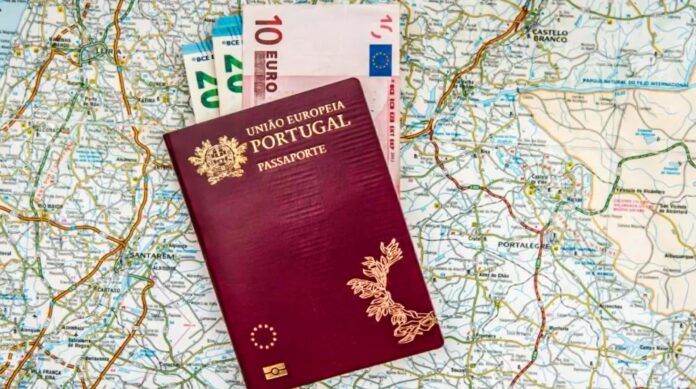The Portugal Golden Visa is one of the most popular residence-by-investment options in Europe, offering a clear path to citizenship and gaining one of the strongest EU passports. Here’s everything you need to know about the golden visa program in Portugal.
Portugal is known for its Port wine, fado music, piri-piri flavors, and soccer stars like Cristiano Ronaldo. However, at Nomad Capitalist, we believe Portugal’s biggest attraction is its highly regarded EU golden visa program.
Also Read: Top Digital Nomad Visas in Europe for Pakistani Citizens: Your Ultimate Guide
As a member of the EU, Portugal offers a high quality of life, including great work opportunities, healthcare, climate, infrastructure, stability, safety, and education.
Portugal’s excellent living standards make it an appealing destination for those seeking to move to a European country. For those who can invest, Portugal’s golden visa program is one of the best ways to do so.
This program is a fast-track residence-by-investment opportunity, offering a Portuguese residence permit to non-EU/EEA citizens who invest in the country for five years.
This golden residence also allows holders to apply for citizenship after several years, provided they meet the necessary requirements.
Let’s take a closer look at how it works.
Please note that this information is for general guidance and should not be taken as tax or legal advice. Consider it as a way to determine if Portugal’s residence program is suitable for your personal needs.
What is the Portugal Golden Visa?
Launched in 2012, Portugal’s golden visa program offers residency to foreign nationals who make qualifying investments in the country.
While real estate used to be the most popular investment option, recent changes have eliminated this route. Now, investors can qualify by creating jobs, supporting research, or investing in venture capital and private equity funds.
The least expensive option for qualifying is €250,000.
Despite these changes, the golden visa remains an appealing choice for those seeking Portuguese and EU residency, with the potential to eventually gain citizenship.
Residency grants visa-free travel within the Schengen Area and eligibility for citizenship after five years. The program has minimal stay requirements, with investors only needing to spend seven days in Portugal in the first year and fourteen days every two years thereafter.
Golden Visa Portugal Investment Options at a Glance
We’ve already mentioned the different investment options, now let’s take a look at what each one requires:
- Venture Capital Fund investment: Minimum investment of €500,000 in an eligible venture capital fund, excluding real estate-related funds.
- Cultural Heritage or Arts donation: Contribution of €250,000 towards arts, heritage or cultural preservation projects.
- Scientific research: Minimum investment of €500,000 in science or technology research.
- Job creation: Establish and maintain at least ten jobs in Portugal.
- Cultural investment: Contribute €250,000 (€200,000 in low-density areas) towards cultural projects.
- Company investment and job creation: Invest €500,000 in an existing company, with a commitment to create five permanent jobs or maintain ten existing ones (five of which must be permanent).
While this helps to give you an overview, we’ll cover these options in more detail later on.
Can You Still Get a Golden Visa in Portugal?
Yes, you can still get a golden visa in Portugal but the investment options and thresholds have changed.
It’s also worth mentioning that Portugal’s NHR tax regime has also ended . This was a big selling point for many expats getting a golden visa in the country. Unfortunately, no new NHR applications are being taken.
Golden Visa Portugal History
Portugal wasn’t always open to foreign investment, but after the Great Recession of the early 2000s severely impacted its economy, the country sought external solutions.
On October 8, 2012, Portugal launched Europe’s first golden visa program, aimed at attracting foreign investors to boost the government’s finances and revitalize the real estate market.
Over a decade later, the program has proven successful. Since its launch, more than 15,000 investors have participated, contributing over seven billion dollars to Portugal’s economy.
It’s important to note that more than 90% of applicants have secured their Portuguese residence permits through real estate investments, making it the most popular investment option to date.
Recent Portugal Golden Visa Changes
Many people have been asking if Portugal’s golden visa has been suspended. What actually happened is that Portugal’s parliament has passed a budget proposal to amend the golden visa program’s underlying laws.
The passing of legislation in October 2023 has closed the path to Portuguese residency and citizenship through property investment.
However, although the real estate investment option has closed, Portugal’s golden visa program is still open. The government also announced that the 6- to 18-month duration of the golden visa application process will now count towards the five-year period for qualifying for citizenship.
So now, the five-year period begins on the day an investor submits an application.
The Benefits of the Portugal Golden Visa Program
Portugal’s top-notch Tier A passport allows holders to travel to 175 countries visa-free as of 2024, making it the third most powerful passport, according to our Nomad Passport Index .
While your initial investment in a residence permit will not automatically get you citizenship, it will set you on the path towards it. And, at just five years, Portugal’s naturalisation timeline is one of the shortest in Europe.
You don’t, however, have to wait for citizenship to enjoy the travel benefits available. Your Portugal residency visa permit will grant you visa-free travel privileges within the Schengen Area and many other countries around the world.
Having the Portugal residency visa permit in most Schengen countries, including 25 European Union member states, will give you more legitimacy when applying for visas in other countries. This is a particularly attractive aspect of Portugal’s Golden Visa for those with limited travel privileges based on their current citizenship.
Aside from the Portuguese passport granting you the right to live in Portugal and eventually obtain citizenship, your residency visa will also allow you to work there legally. In addition, as a resident of an EU country, you have the right to live and work in any of the EU/EEA countries.
So, if you’d rather spend your time working and living outside Portugal while you wait for citizenship by naturalisation, you can.
In order to be eligible for naturalisation, Portugal requires that you remain in the country for a minimum of seven days during your first year with a residency visa and 14 days for each subsequent two-year period.
The program is also considered relatively stable and is widely supported by political parties in Portugal. Even as it has made changes, the government has made a concerted effort to communicate that the program is still in effect and that investors will not experience negative impacts.
You are safe to assume that the government won’t change its mind again tomorrow and kick you out.
And if you happen to have crypto investments, you won’t incur taxes when you trade or transact cryptocurrencies in Portugal, which can play in many people’s favour.
Finally, if a golden visa isn’t an option for you, there are other ways to become a resident of Portugal, including demonstrating certain assets, getting a job in the country or having a Portuguese spouse or domestic partner.
Compared to these other residence pathways, the benefit of the golden visa is that it allows you to bypass all the standard requirements.
But note that while the golden visa removes the language requirement for residence, you will need to know some Portuguese to become a citizen.
Portugal Golden Visa Process, Documents and Fees
It’s essential to ensure you meet all the Portugal golden visa requirements when applying for the Portugal residence permit.
To be eligible, you must meet several Portugal residency visa requirements:
1. Be a Third-Country National
This requirement simply means that you cannot already be a Portuguese citizen or a citizen of any EU or EEA country.
Over half of all current applicants are from China, but that number has decreased as applicants from other countries such as Russia, Turkey, South Africa, Brazil, and others have grown.
Applicants from countries other than these top five have grown from 1.8% in 2015 to over 11% in 2021 — a testament to the program’s growing popularity.
2. Make and Maintain a Qualified Investment for a Five-Year Minimum
As the primary applicant, you must keep the investment as long as you and your dependents have Golden Visa residency status. However, once you become a permanent resident or Portuguese citizen, you no longer need to maintain the investment.
3. Fulfill the Minimum Residence Requirement
You must spend at least seven days in Portugal during your first year as a resident and no less than 14 days for each subsequent two-year period after the initial year.
You must also commit to maintaining your investments for a minimum of five years.
4. Provide Proper Documentation
When it comes to paperwork, Portugal’s process is more straightforward than many Caribbean citizenship-by-investment programs .
You can now apply online through their Immigration and Borders Services portal, Serviço de Estrangeiros e Fronteira (SEF) . If you want to save yourself the hassle, you can also have a legal representative file on your behalf.
Regardless, it makes sense to have a good understanding of the Portugal golden visa application process.
There are a few moving parts and potentially some things that can go wrong if you’re not careful.
The application process requires that you submit personal documents as well as proof of your investment, including the following:
- A passport or other valid travel ID
- Proof of your legal entry into the country
- A certified copy of a background check from your country of origin or residence
- A completed permission form which authorises SEF to access your Portuguese criminal records
- Proof of health insurance to cover your stay in Portugal
- A declaration stating that you are compliant with the investment requirements
- Evidence that you are in good standing with the Portuguese Tax and Customs Authority and Social Security systems
- A statement from your Portuguese bank that confirmed the transfer of funds
- Proof of payment of the Portugal golden visa fees.
All documents must be dated within 90 days of submitting your application.
On top of those documents, you need to prove that you are committed to maintaining your investment for at least five years. Some examples of proof you can provide include:
- Employment contracts for jobs that you created within the country
- A bank statement that displays your capital contributions.
The SEF also requires that documents be translated by a Portuguese notary or by a Portuguese consulate in the country of origin.
5. Pay All Related Fees
The Portuguese government knows that its audience consists of wealthy investors who want a passport that offers access to the EU and is willing to pay for it.
This Tier A passport does not come without a hefty price tag.
In addition to your financial investment, every applicant, including any dependents, must pay a fee of €5,000 (US$5,364). Fortunately, when you renew your visa, the fees are cut to 50% of the original price.
In addition to those fees, there is a €533 (US$571) processing fee for each applicant. The processing fees must be paid with the initial application and each renewal.
Qualifying dependents include the applicant’s spouse and children under 18 years old; children over 18 can qualify if they are unmarried and in school. Retirement-aged parents in the family can also qualify for this visa.
While the Portugal golden visa involves less paperwork than similar programs, it’s a good idea to get professional help to deal with the country’s bureaucracy and ensure everything is done correctly. Lawyer fees for the Portugal golden visa process can cost anywhere between €4,000 to €5,000 (US$4,291 to $5,364).
Again, this program is costly, but you need to consider it a price worth paying in order to get the best.
Portugal Golden Visa Cost
So, when all investments and fees are considered, how much will a golden visa set you back?
The total cost for a Portugal golden visa will start with a minimum investment of €250,000 to €500,000, depending on the chosen investment route. Legal fees, processing fees and other associated costs further add to this.
Standard legal fees range from €4,000 to €5,000 for the main applicant, plus additional fees for dependents, which can average around €500 for a spouse (but are subject to vary depending on your chosen lawyer).
There’s also a €533 government analysis fee and an issuance fee of €5,325 per person once the visa is approved.
For renewals, each applicant incurs a €2,663 renewal fee every two years, along with €200 in administrative costs for translation, notarisation and document shipping.
Over the five-year golden visa period, additional charges for renewal and document processing can bring the cumulative cost to well over €10,000 or more per person, excluding the primary investment.
Is it the cheapest way to get residence and citizenship in Portugal? No, but it does offer unique conveniences.




